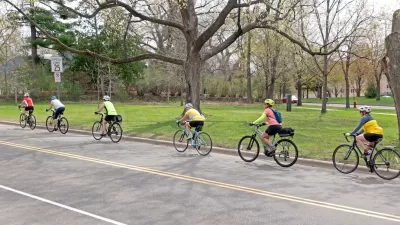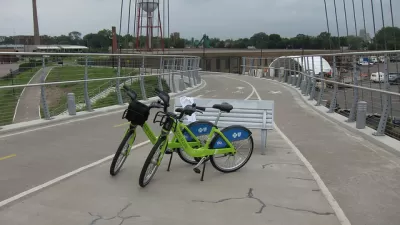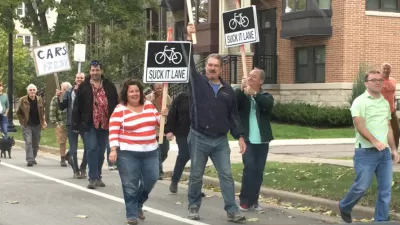Swatting down untruths and misinformation by bike lane opponents in St. Paul doesn't require a PhD, but it helps.

Writing in BeyondChron, Bill Lindeke sets the record straight on a few points used by bike lane opponents as St. Paul expands its bicycle path network through the city. Lindeke, a St. Paul Planning Commissioner who has a PhD in geography and bicycle planning, writes about his frustration at flyers given to neighbors along Cleveland Avenue, where opponents have stepped up efforts to block a bike lane on the street that would result in the loss of or shift of some street parking to side streets.
If you believe that your career depends on a parking space, there’s no amount of research, argument, or kindness that will convince you that a bike lane might benefit Cleveland Avenue.
And to make a long story short, this flier represents a dishonest argument about street design that appeals to those invested in the status quo. On the surface, these objections might seem reasonable. But they actually reflect how inflexibility about street design and urban transportation, in order to cling to slight comforts, keeps a dangerous precedent in place for another decade.
Opponents have cited the proposed reduction of driving lane widths on Cleveland from 12 feet to 11 feet as creating a dangerous situation, although as Lindeke points out, just the opposite is true. Statistics show that in the urban environment wider lanes are more dangerous than narrower lanes.
Opponents are also asking that the route be entirely "off-street" for safety reasons, or else the entire thing should be scrapped. Lindeke notes that "smart cities build infrastructure for the whole range of bicyclists and allow them to choose where and how quickly they want to ride… it turns into a spectrum of bicycle infrastructure." Asking for perfection or nothing is just another tool of opponents to block bicycle lane development, Lindeke argues.
FULL STORY: Two Anti-Bike Lane Narratives that Need to Stop

Maui's Vacation Rental Debate Turns Ugly
Verbal attacks, misinformation campaigns and fistfights plague a high-stakes debate to convert thousands of vacation rentals into long-term housing.

Planetizen Federal Action Tracker
A weekly monitor of how Trump’s orders and actions are impacting planners and planning in America.

San Francisco Suspends Traffic Calming Amidst Record Deaths
Citing “a challenging fiscal landscape,” the city will cease the program on the heels of 42 traffic deaths, including 24 pedestrians.

Defunct Pittsburgh Power Plant to Become Residential Tower
A decommissioned steam heat plant will be redeveloped into almost 100 affordable housing units.

Trump Prompts Restructuring of Transportation Research Board in “Unprecedented Overreach”
The TRB has eliminated more than half of its committees including those focused on climate, equity, and cities.

Amtrak Rolls Out New Orleans to Alabama “Mardi Gras” Train
The new service will operate morning and evening departures between Mobile and New Orleans.
Urban Design for Planners 1: Software Tools
This six-course series explores essential urban design concepts using open source software and equips planners with the tools they need to participate fully in the urban design process.
Planning for Universal Design
Learn the tools for implementing Universal Design in planning regulations.
Heyer Gruel & Associates PA
JM Goldson LLC
Custer County Colorado
City of Camden Redevelopment Agency
City of Astoria
Transportation Research & Education Center (TREC) at Portland State University
Jefferson Parish Government
Camden Redevelopment Agency
City of Claremont





























